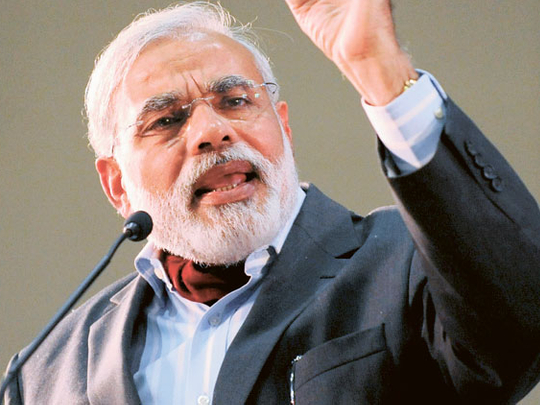
If the surface indicators were considered, it would be obvious that the dice was heavily loaded in Narendra Modi’s favour vis-a-vis Manmohan Singh, if a comparison of their Independence Day speeches was made.
Where the prime minister delivered his speech in a flat monotone, replete with soporific homilies, the Gujarat chief minister was all fire and brimstone. His was the kind of speech, full of rhetorical flourishes tugging at patriotic heart-strings, which would score high on the social network sites, which constitute a large part of his political base. In contrast, Singh couldn’t but have fared poorly among the excitable netizens because neither his dhobi list of official claims nor his unassertive body language can be deemed inspirational.
To be fair, Singh’s disadvantages have always been known. Not only is he a poor speaker who makes no eye contact with the audience, but he is also burdened with a litany of governmental failures — inflation, economic slump and trouble on the border. Evidently, it would have taken an exceptionally effective orator to be able to rise above these pitfalls and hold the audience in thrall. Otherwise, the reaction of the average person will be that promises such as that of feeding the underprivileged or eradicating corruption have been made before with little effect.
From this standpoint, Modi was on a stronger wicket. He could make promises without having to carry the burden of fulfilment. He may have also had a point in his claims on Gujarat, and these have been backed by his electoral successes. But the jury is still out on whether the Gujarat model of development and, even more, his authoritarian style of governance, are suitable for the whole country.
It is in this context that the prime minister’s warning against the purveyors of sectarianism is relevant. If this comment was virtually the only occasion when Singh deviated from outlining his government’s “achievements” to make a political point, Modi’s was almost entirely a political speech. It was suitable for an election rally, but not for an occasion to celebrate Independence Day.
His targets were predictable — the dynasty and the prime minister’s supposed subservience to it — and chest-thumping jingoism, with Italy being roped in for criticism for killing “our fishermen” along with the customary sabre-rattling against Pakistan and China. Surprisingly, there was an acknowledgement by Modi of the need for the prime minister to observe diplomatic niceties when referring to Pakistan. At the same time, he felt that Singh’s observations would not boost the morale of the Indian soldiers.
However, even if sections in the Bharatiya Janata Party (BJP) are pleased with a highly effective election speech, it is doubtful if everyone in the party will be amused by the way Modi continues to push himself forward as a prime ministerial candidate. Modi’s decision, therefore, to pit himself as a ‘shadow’ PM, and call upon the country to compare his speech with the prime minister’s, is clearly another attempt to force the BJP to nominate him. It doesn’t take much foresight to see that if the chief minister can use such bulldozing tactics against his own party, no one can anticipate what he may do if he rises to a higher position.
It is worth noting that the BJP’s ‘mentor’ L.K. Advani has deflated Modi’s prime ministerial pretensions by greeting Singh on the day, and the Shiv Sena has said that the prime minister can be criticised for 364 days in a year, but not on Independence Day. It was a telling commentary on Modi that even the rabble-rousing Shiv Sena sounded more responsible than the BJP’s poster boy.
This is one aspect which can make one see the supposed face-off between Singh and Modi in a different light. Where the former came through as a sobre, if colourless, politician who admitted the existing difficulties by saying that the period of slow growth would not last, Modi was full of sly digs.
For once, however, Modi acknowledged the contributions of other chief ministers, including presumably those of the Congress, to Gujarat’s development. Perhaps he was trying to nullify Advani’s charge that a chief minister like Shivraj Singh Chauhan had better claims for praise since he had lifted an under-developed province like Madhya Pradesh to be among the top few of the developed states while Gujarat was already a front-runner when Modi came to power.
However, Modi’s attempt to draw a distinction between what President Pranab Mukherjee said about Pakistan and Singh’s comments ignores the fact that the president does not express his personal views; he speaks for the government on policy issues. As such, his speech — on occasions such as Independence Day — is vetted by the cabinet. To claim, therefore, that the prime minister is “softer” in his attitude than the president is incorrect.
Apart from his supporters in the cyber world, therefore, it is doubtful if Modi greatly impressed large sections of the others. Given the uncertain political future, neither Singh nor Modi can be sure about being the next PM. While the former is hobbled by his administration’s “ethical and governance deficits”, as Finance Minister P. Chidambaram once said, Modi is yet to live down the spectre of the 2002 riots, as the latest US comment on the denial of visa to him shows. The face-off, therefore, was more theatre than reality.
— IANS
Amulya Ganguli is a political analyst.









